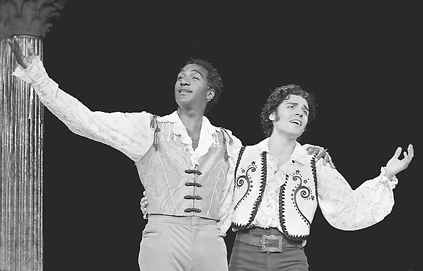Updated Shakespeare adaptation still fresh 34 years later
B
y CHRISTOPHER BYRNE
Thirty-four years ago, the Public Theater was looking for a way to make Shakespeare’s earliest comedies, “Two Gentlemen of Verona” accessible to the young audience that the organization’s Mobile Theater would be entertaining in various places around the city. What began by adding a few songs to a fusty play (by many standards), became a rollicking musical that took the 1972 Tony Awards for Best Musical, Best Book, and a nomination for Best Original Score. Along the way, though, something else happened. The musical was transformed, and a grand tradition of turning Shakespeare into contemporary musicals (“Kiss Me Kate,” “Your Own Thing,” etc.) was continued.
Yet “Two Gents,” as it’s called colloquially, did much more than that. It introduced politics and the concept of inclusion into the theater and a restless world. It pushed the traditional form of the musical with a score that includes 35 songs, and it allowed Shakespeare’s voice to be heard in new ways, with new relevance. I remember as a young boy seeing this show for the first time and being amazed at how romantic—and how “dirty” this show was. Yep, Shakespeare was for me!
But more was aroused than just the prurient interests of a pre-teen. Galt MacDermot’s music, as it had with “Hair,” established the rock idiom as a Broadway style. John Guare’s lyrics, helped make the “moon/June/spoon” lyrics of typical Broadway shows as dated as, say, Shakespeare. The result was fresh, new, exciting and daring, and it would not be the last time that the Public would change the face of musical theater. “Chorus Line” and “Caroline, Or Change” both spring to mind as recent examples.
There’s no denying the power of history, but the proof of the theater is always in the current production. As “Two Gents” returns to its first home after an absence of 34 years, the revival, under the direction and choreography of Kathleen Marshall, will no doubt delight people who remember the original, but more importantly gives a fresh look at what can now be called a classic American musical.
I chatted with Marshall at an open rehearsal for the play at the Delacorte in Central Park during one of those really hot days a few weeks ago. Marshall and her cast were going through some of the key numbers, undeterred by the sun beating down on the stage and captivating the usually blasé.
Marshall, who directed the stunning revival of “Wonderful Town,” and who has signed on to direct Roundabout’s “The Pajama Game” later this season, admitted, “I’m the revival queen, but I love this show so much. There is a real delight in bringing back a show that people don’t know, especially with a score that I think is so wonderful and delightful. It’s exciting to sit in the audience and hear an audience react [to the show] for the first time.”
She noted that “Two Gents” really did burst the bonds of the musical, both structurally and musically. “There are all these little fragments of songs. There is pure Shakespeare, and some of it is contemporized. And then there are long stretches of the show that are just one song back-to-back so it becomes like a mini concert, so it doesn’t behave like a musical in a traditional way.”
This abandonment of so-called traditional form also helps underscore the political nature of the show. First produced at a time when an increasingly unpopular president was promoting an increasingly unpopular war, Marshall says that the echoes are “kind of scary. Here we are 34 years later, right back where we were, with an unpopular war and needlessly losing American lives.”
Acknowledging the political nature of the piece, John Guare has even written some new lyrics, lampooning the hypocrisy of not allowing gays in the military and the intractable nature of some religious zealots.
Yet the politics are only one part of what is essentially a love story replete with girls disguised as boys, love letters, disappointed young love found, lost, found again, and the obligatory happy ending. (You can’t avoid the prefiguring of “A Midsummer Night’s Dream” in the plotting, either.) Bringing all this to life on the stage are the incomparable Norm Lewis, who as one of the gentlemen, Valentine, mixes comedy and sex appeal in a totally charming and vocally stunning performance. Oscar Isaac as Proteus, the other gent, is more fiery and hilarious, a bit more inconstant but ultimately a good man in love. Rosario Dawson, who will be featured in the upcoming film version of “Rent,” tackles Julia with all the wit of a Shakespearean heroine and all the brilliance and sass of a contemporary rock star, and Renee Elise Goldsberry as Sylvia brings that all-too-rare ability to marry rock and roll with extraordinary vocal technique and classic comedy.
Together, they and the whole company keep this show romping from beginning to end—and scenery by Ricardo Henandez and costumes by Martin Pakledinaz keep this show squarely and delightfully in the 1970s. Peter Kaczorowski’s lighting makes the most of the setting in the park.
In fact, the Park almost becomes a character in the piece. It’s a new venue for Marshall, but even the intermittent arrival of raccoons on the stage, weather, and all this unpredictable stuff so foreign, generally, to the modern theater, hasn’t fazed her. Instead she’s created a production that is likely to be fully enjoyed and fondly remembered—for at least another 34 years.
gaycitynews.com



































